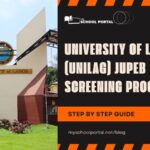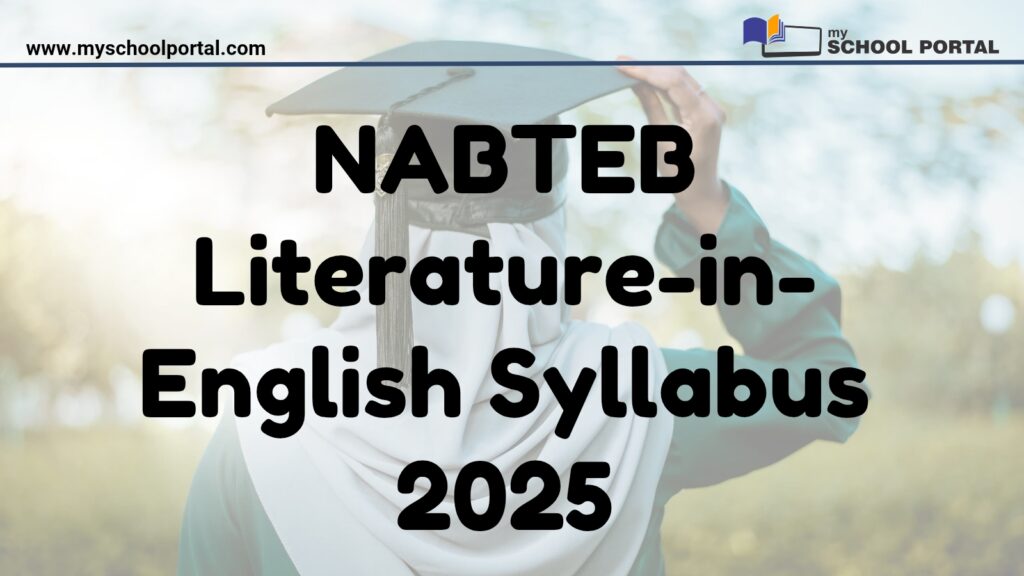If you’re a student preparing for the 2025 NABTEB Literature-in-English examination, one of your best tools for success is understanding the syllabus. This subject is essential for all Arts students and forms a core requirement for admission into higher institutions offering courses in communication, education, literature, law, and the humanities.
This guide breaks down the entire NABTEB Literature-in-English Syllabus, including the examination structure, key objectives, literary genres, set texts, and recommended books. Let this serve as your roadmap to structured and confident exam preparation.
Structure of the NABTEB Literature-in-English Exam
The Literature paper is divided into three components:
PAPER I – Objectives (50 Questions)
This is a multiple-choice section covering:
- Literary principles and appreciation
- Literary techniques and devices
- Excerpts from African and Non-African drama texts
- Unseen prose and poetry passages for analysis
PAPER II – Drama and Poetry
Divided into four sections:
- Section A: African Drama – One play
- Section B: Non-African Drama – One play
- Section C: African Poetry – Traditional and modern African poems
- Section D: Non-African Poetry – Classical and modern English poems
PAPER III – Prose
Divided into two sections:
- Section A: African Prose – One novel
- Section B: Non-African Prose – One novel
Detailed NABTEB Literature-in-English Syllabus Topics and Learning Objectives
Below is a structured breakdown of what you are expected to learn and demonstrate in the Literature exam.
1. Comprehension and Interpretation
- Understand unfamiliar words in context
- Answer comprehension questions based on given literary texts
- Read selected passages at 100 words per minute
- Engage with text-based questions that test understanding, vocabulary, and literary techniques
2. Literary Appreciation
- Identify and appreciate figurative language, imagery, tone, and writing style
- Recognize the characteristics of a good literary work, including:
- Language and diction
- Theme and message
- Plot development
- Characterization
- Setting and mood
- Analyze unseen passages for literary devices and authorial techniques
- Evaluate how print layout, illustrations, and structure affect readability and aesthetics
3. Literature Genres and Elements
- Understand the distinctions between:
- Prose – narrative structure, characters, events, and narration
- Poetry – rhyme, rhythm, imagery, symbolism
- Drama – dialogue, stage directions, character interaction
- Analyze elements such as:
- Plot structure (e.g. linear, flashback)
- Narrative techniques (first-person, third-person)
- Figures of speech: simile, metaphor, hyperbole, personification, climax, irony
4. Creative Interpretation
- Write and interpret short literary texts or excerpts
- Discuss themes in relation to real-life experiences
- Appreciate the beauty of literary expression, emotions, and messages conveyed through language
Official NABTEB 2025 Literature Texts
Below are the prescribed literary texts to be studied for the examination, categorized by genre and origin.
African Drama
- The Trials of Brother Jero – Wole Soyinka
- Sizwe Bansi is Dead – Athol Fugard
Non-African Drama
- The Merchant of Venice – William Shakespeare
- The Taming of the Shrew – George Bernard Shaw
African Poetry
- My Song Bursts – Traditional
- Salute to the Elephant – Traditional
- Nightfall in Soweto – Oswald Mtshali
- Building the Nation – Henry Barlow
- An African Thunderstorm – David Rubadiri
- Ours to Plough, Not to Plunder – Niyi Osundare
Non-African Poetry
- Ode to a Nightingale – John Keats
- A Red, Red Rose – Robert Burns
- Death Be Not Proud – John Donne
- Journey of the Magi – T.S. Eliot
- A Poison Tree – William Blake
- Ulysses – Alfred Tennyson
African Prose
- Slave Wife – Buchi Emecheta
- Weep Not, Child – Ngũgĩ wa Thiong’o
Non-African Prose
- A Christmas Carol – Charles Dickens
- King Solomon’s Mines – Sir H. Rider Haggard
Recommended Reference Books and Anthologies
To deepen your understanding of the texts and improve your analytical skills, consider reading the following scholarly works and collections:
- Ford, B. (Ed.). The Pelican Guide to English Literature (Vols. 1–7). Pelican Books.
- Hayward, J. (Ed.). The Penguin Book of English Verse. Penguin.
- Obiechina, E. N. Culture, Tradition, and Society in the West African Novel. Cambridge University Press.
- Omonode, B. Introduction to Literature. University of Benin Press.
- Osundare, N. (1986). The Eye of the Earth. Ibadan: Heinemann.
- Palmer, E. An Introduction to the African Novel. Heinemann.
- Sehanu, K. E., & Vincent, T. (Eds.). A Selection of African Poetry (Annotated). Longman.
Tips for Success in NABTEB Literature-in-English
- Study each text thoroughly — focus on theme, character development, setting, and literary devices.
- Practice identifying figurative language in unseen passages.
- Write short essays to explain themes and apply them to real-life issues.
- Familiarize yourself with common exam questions and past papers.
- Revise regularly and use the syllabus to track your progress.
Need Help or Have Questions?
If anything in the syllabus is unclear or you’d like help interpreting certain literary texts, feel free to drop your questions in the comment section or consult your teacher. Early preparation makes all the difference.
Spread the Word
If this guide helped you, kindly share it with friends, classmates, or fellow candidates preparing for NABTEB Literature-in-English.
Related
Stay updated with the latest student resources and insights from My School Portal! Subscribe to our newsletter for fresh content delivered straight to your inbox—no spam, just value 😊
Related posts:


















